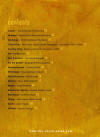|
|
the-south-asian.com August 2007 |
|
|||
|
Famous
Bazaars
Remaining
articles
Books Between
Heaven and Hell
|
|
||||
|
Page 2 of 3 Bangladesh NGOs going global By Akhil Bakshi (cntd)
Both Photos -Linda Næsfeldt © Nobel Peace Center, Oslo, Norway. The Grameen Bank (Village Bank) A little over thirty years ago, in 1974, Muhammad Yunus, disillusioned by the sophisticated economic theories he was teaching at the University of Chittagong in Bangladesh, decided to make a list of the victims of money-lenders in the village next to the campus. "When my list was done, it had the names of 42 victims who borrowed a total amount of US $ 27. I offered US $ 27 from my own pocket to get these victims out of the clutches of those money-lenders. The excitement that was created among the people by this small action got me further involved in it. If I could make so many people so happy with such a tiny amount of money, why not do more of it? ". The idea of Grameen Bank project germinated and evolved into a great social movement of historic proportions. The organisation and its founder Muhammad Yunus were jointly awarded the Nobel Peace Prize 2006. Founded in 1983, the Grameen Bank today has 7 million borrowers-owners (97 per cent of whom are women) in 73,000 villages of Bangladesh. The Bank has given out loans totalling US $ 6 billion, 99 per cent of which has been repaid. The collateral-free loans have been given out for income-generating and micro-enterprise purposes to the poor families. Housing loans have helped construct 640,000 houses – all owned by women. Net result - 58 per cent of the borrowers have crossed the poverty line – they eat three meals a day, live in rain-proof houses, have clean drinking water and use a sanitary toilet. The Bank has focused on women borrowers. According to Muhammad Yunus, "We found giving loans to women always brought more benefits to the family." Women gave priority to the children, sent them to school, many of whom are now professionals. Grameen Bank gives 30,000 scholarships every year to talented students. The new generation of educated children will further get their families out of the poverty trap. Grameen has also created two social businesses – a yogurt factory, in a joint venture with Danone, to provide fortified yogurt to malnourished children; and a chain of eye-care hospitals that will provide cataract surgeries at differentiated cost to the rich and the poor. Grameen Bank has 2,283 branches. It works in 73,609 villages. Total staff is 20,223. Outside Bangladesh, Grameen Bank has a presence in India, Pakistan, China, East Timor, The Philippines, and as far west as Bolivia, Dominican Republic, El Salvador, Haiti, Honduras, and Mexico in Latin America and Egypt, Morocco, Tunisia, Nigeria, Rwanda and Uganda in Africa. Grameen Bank has initiated several innovative programmes for poverty eradication – Struggling Members Programme focuses on the beggars who are provided interest-free loans (typically about $12) that can be repaid in "whatever amount they wish, whenever they wish." Of the 85,000 beggars in the programme, about 5,000 have already stopped begging completely by using the loan to buy and sell low-priced merchandise such as snacks, or small household items. Grameen Phone (Village Phone), owned jointly by Telenor of Norway and Grameen Telecom of Bangladesh, was an attempt to take Information and Communication technology to the poor. Loans were given to the economically disadvantaged women to buy mobile phones in order to sell phone services in the village. With more than 10 million subscribers, Grameen Phone is the largest mobile phone company in Bangladesh today – 300,000 women providing telephone services in all the villages of Bangladesh. Muhammad Yunus, disillusioned with the country’s two main political parties (the Bangladeshi Nationalist Party and the Awami League), recently announced that he is forming his own political party, Nagarik Shakti. He plans to contest all seats in the general elections which were postponed indefinitely in January. "I am now determined with my decision to join politics by floating a new political party which aims to present a fresh democratic culture to the nation," the state-owned BSS news agency has quoted him as saying.
|
|||||
|
Copyright © 2000 - 2007 [the-south-asian.com]. Intellectual Property. All rights reserved. |
|||||



